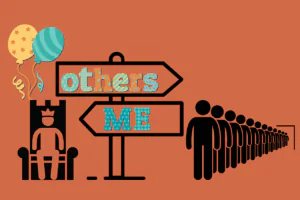Guest post by Sarah VanMeter, LCSW
Has the world felt like it turned upside down over the last couple of years? You’re not alone. Many people are grappling with the impact of the pandemic, civil unrest, political tensions, inflation, and more. The stress has created an increase in depression, anxiety, worries, and even suicidal ideation. A record number of people are reaching out for mental health services. You might be unsure of what to do, how to get the help you need, and how to find a therapist.
First, I have to say it is ALWAYS okay to reach out for help. You don’t need a huge reason or have a chronic mental health condition to ask for help from a therapist or counselor. You are NEVER weak, foolish, sick, or crazy for needing another person to talk with. Everyone has times when their life feels overwhelming. You start to question how you are going to make it through the month, week, or even day.
In times like this, it can be very helpful to have an unbiased person remind you of the amazing person you are. They can also help you find the words and skills to get through the month… week… or even day. A mental health professional knows the skills and tricks to manage mental health. They can help you get back to the person you want to be.
Steps to Find a Therapist
Okay, now you have decided that you want to reach out for services. Many people tell me this is the scariest part of the experience. They don’t know how to find help or how much it will cost. They don’t know what to expect. Here are the steps I suggest that you follow:
Step One: Contact your insurance provider
The number is on the back of your insurance card and is often called “customer service” or “member services”. Your insurance plan has its own structure: PPO, HMO, EPO, and other acronyms. That structure determines who you can see. Some therapists accept all insurance plan structures, some accept only certain plan structures, and others don’t accept insurance at all. So knowing what you have is an important first step.
Once you know your plan’s structure, find out specifics. Each insurance company and each plan have different deductibles, copays, and/or coinsurances. Most therapists and agencies won’t be able to tell you what the exact plan details are of your plan. They may know an overview, but once again each plan is different. I would recommend that you confirm which mental health services they cover, what your deductible is, what your session copay or coinsurance is, and the number of sessions they approve. This will help to avoid any surprises when the statements start to roll in.
Another thing you can do when you call is to ask if the therapist or the agency for whom they work completes an insurance verification. An insurance verification breaks down deductibles, copays, and services covered. Not all agencies do this, so it is best to always do your homework with your insurance company first.
Step Two: Where to Find a Therapist
Ask trusted others and access therapist directories. As you start this step, know that it’s good to have some paper handy to make a list for recommendations from others and from directories. Asking for recommendations from trusted others is one way to find a therapist. For example, asking your physician, chiropractor, bodyworker (e.g. massage therapist, Reiki practitioner, energy worker, etc.), or other healing arts professional can be a useful method. Ask your clergyperson. They often will have “go-to” counselors to whom they refer. You can also ask friends for their recommendations. You don’t have to say it’s for you if you don’t want to.
Therapist directories are perhaps the most efficient way of finding a therapist. A place to start is to look on the “providers directory” that your insurance company has on their website. Using your insurance company’s directory can be an easy way of finding a counselor close to you. However, these insurance company directories tend to have little “extra” information about the therapist, and the directories can be out of date. Please be aware of that when you start making phone calls.
Other common therapist directories are Psychology Today, Good Therapy, Therapy Tribe, and Therapy Den. Most of these directories have at least a bio and possibly a picture of the provider. Many of them are searchable so you can see which therapists in the directory are in your zip code, take your insurance, work with your issue or age group, etc. Read through these to see if the provider is a fit for you. Look at their training and specialties. For example, the training of a child therapist is a different than an adult therapist. Not all providers have the training to treat OCD (obsessive compulsive disorder), eating disorders, relationship concerns, or trauma, to name a few, so read carefully.
Finally, you can do a Google search for “counselors near (town/state)” or “therapists near (town/state)”. This will return a list of “Places” that fit that search and a map with where they’re located in your community. Then click on the therapists that come up to go to their website. Browsing the therapist’s website can give you a feel for the counselor and provide some of that training and specialty information I mentioned above.
Step Three: Make an Appointment
Now it’s time to make phone calls to try to set up services. After deciding to find a therapist, I think this can be the most taxing step. Due to the high demand for mental health services, you should call any providers that you remotely feel might be a fit. Have your list from Step Two handy, and I would suggest getting a notebook of some sort to help you keep track.
Important things to write down as you make your calls are: the agency, practice, or provider you called, their address and phone number, who you spoke to, and the outcome of the call. It would also be a good idea to note the date and time that you called. People often call multiple providers when trying to schedule an appointment. When a provider or agency staff calls back it can be confusing to remember who you called or spoke to. I have experienced times when a potential client has spoken to several providers or agencies, and they can’t remember who they left messages for.
When speaking to the intake staff at the agency or practice, or to the provider themselves, feel free to ask them questions. You may even want to write up a list of questions sort of like interview questions.
For example, you might confirm that they take your insurance. You can ask about how the sessions are structured and how much it will cost. You can ask about the training the therapist has had or how much experience they’ve had with the issue you’re bringing to therapy. For instance, you can ask if they are a therapist for anxiety and depression. Even in a big agency where you may be talking to an intake coordinator, that person is often aware of which providers have what training or background. If you are unsure of what questions to ask, you can let them know that you are new to this and are unsure of what to do. Once again, most providers and intake staff are happy to help walk you through the process.
The other thing I would suggest is to let them know why you are trying to find a therapist. They do not necessarily need to know all the details of what’s happening, which can wait for the first session, but an overview is okay. In many cases letting people know why you are seeking services will allow them to help guide you to someone who may be a fit.
For example, I am known within my community as a “teens therapist.” In an agency where I previously worked on the youth team, our intake coordinator did a good job of determining which adolescent therapist was the best fit for the teen being referred to the agency. When she discovered that a parent was calling for a particularly struggling teen, she would approach me and say “Sarah, I have a Sarah case for you! Can you get them onto your schedule?” Most therapists in mental health are aware of the specialties of other providers, agencies, social services, schools, hospitals, etc. They can help guide you to places that may be a fit for you.
When scheduling an appointment, please realize that you might have to make some adjustments with your schedule to get an appointment. After-school and evening appointments are ALWAYS in high demand, especially for youth. That means for a youth provider there may be thirty to forty people wanting eight to ten spots in the therapist’s schedule.
Additionally, due to the high demand for services in the pandemic and post-pandemic, many providers have full schedules. We are aware that you might need an evening time and weekly sessions. However, there may only be one opening in the agency/practice and it is during the day for every other week. My advice: take it! I have been recommending to everyone I talk to that it is better to get into someone’s schedule at a time that isn’t ideal for a while than to sit on a waitlist when trying to find a therapist.
You can let your provider know the days or times you would prefer, but please be understanding of the demand they are facing. Providers really do try their best to accommodate a client’s needs when it comes to scheduling, however, sometimes our hands are tied. It may take weeks or even months to get a client into an appointment time that works better for their schedule.
If you are making calls and find that many places are closed to new clients, then you can ask for referrals. Agencies and providers usually have an idea of who is accepting clients, or what the waitlists are. Many of my recent referrals have come from agencies letting people know the status of my waitlist. Try to get on as many waitlists as possible. I know this is upsetting and frustrating to many people. Know that therapists are aware of this. We are trying our best to see people, and it bothers us that we cannot help everyone. Please do not lose hope if you must be placed on numerous waitlists. Providers and agencies are working their best to get through the lists.
Step Four: Complete The Paperwork
After scheduling the appointment, agencies and providers will often send the new client (or patient) intake paperwork. Just like a physician’s or dentist’s office this paperwork needs to be completed before you come in. Most providers will not meet with you if it is not done.
If you are late or must complete the paperwork when you arrive, you will run the risk of not being seen – or your session being really short. If you have any questions about the paperwork, you can always call the agency or provider. They will have no problem walking you through it.
Step Five: Start with Therapy
After all that work finding a therapist, it is time for the first appointment. Here is what to expect.
Most therapists have a similar structure for their first session, which is about gathering information. Therapists use this time to explore what is going on, what symptoms or situations or past events are impacting you, and how we can help you. The counselor usually asks a lot of questions, and they will probably be doing a lot of writing or typing in this session.
You should not be afraid to ask questions, as well. We are aware that coming to therapy might be scary, and that you may be unsure of what is happening or what to expect. Some people worry that we will judge them. Please know that we don’t judge what you are saying. And know that most therapists really like their clients!
Related Reading: How to Open up to a Therapist About Trauma
I warn people that you cannot judge the services you will receive based on this first session, because it is not how therapists typically structure their ongoing sessions. For example, I rarely write during my ongoing sessions with clients. However, because there is so much information covered in the first session, I take notes.
I challenge people to give the therapy at least three and as many as six sessions to determine if this therapist and the type of therapy they do is a fit for you. If the therapist doesn’t feel like a fit, you can have an open conversation about it. A cornerstone of the effectiveness of services is the relationship between a provider and their client. If the therapist doesn’t seem like a fit for you, it is okay to say so. Most providers will work to address your concerns or will try to provide you with a referral of someone who might be a better fit.
Overall, my most important advice for anyone seeking therapist is to be willing to ask questions. I know this can be hard for many people, but those questions allow the therapist to help you more effectively. We are aware of the barriers and concerns. We want to help and if we can, we will.
Has this post encouraged you to find a mental health professional? If you are in the northern Illinois area, the practice I work for, Life Care Wellness can help you get started. Please contact us at our Glen Ellyn, Chicago (Jefferson Park), or Sycamore offices.
Sarah VanMeter works with all ages and she specializes in working with at risk youth, youth in foster care, and those with complex trauma. Sarah utilizes Motivational Interviewing, Cognitive Behavioral Therapy (CBT), and Dialectic Behavioral Therapy (DBT). She has completed training in Trauma Focused Cognitive Behavioral Therapy (TF-CBT), Somatic Experiencing (SE), Health Coaching, and Fostering and Adoptive Concerns. Sarah also has advanced training in working with survivors of sexual assault, as well as Illinois Coalition Domestic Violence Professional certification. In addition to providing therapy, Sarah was part of the Long-Term Recovery Committee for the tornado that impacted Fairdale, Illinois, and she currently sits on the Trauma Informed Committee for the Mental Health Board of DeKalb County in northern Illinois.







